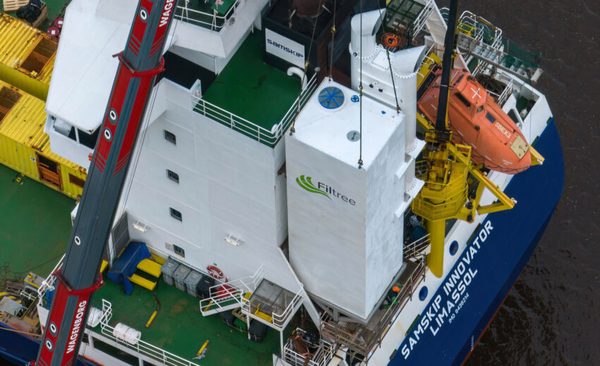The Week in Alternative Fuels
Here are some key developments in alternative bunker fuels from the past week.
 PHOTO: Samskip's short-sea vessel Samskip Innovator runs on biofuel blends and is fitted with a carbon capture and utilisation scrubber unit. Samskip
PHOTO: Samskip's short-sea vessel Samskip Innovator runs on biofuel blends and is fitted with a carbon capture and utilisation scrubber unit. Samskip
The UK-based University Maritime Advisory Services (UMAS) presented a much-needed reality check in its new report. The shipping sector needs to reduce its greenhouse gas emissions by 37% by 2030 and 96% by 2040 to keep global warming below 1.5°C, warned UMAS. It also recommended a number of steps to limit global warming.
UMAS, a University College London-led advisory group, urged shipping companies to improve their ships' fuel efficiency by 40% by 2030 to have a chance at limiting the global temperature rise to 1.5°C. UMAS recommended enhancing vessels' Carbon Intensity Indicators (CIIs) by implementing wind assistance, ship maintenance, waste-heat recovery and other operational measures in order to improve energy efficiency.
There was more talk of CIIs this week. Classification society Lloyd's Register issued guidelines to assist shipowners in collecting data and evidence to support their CII calculations, and highlighted how the IMO regulation allows for ships operating under certain conditions to correct their CII evaluations.
As a near-term measure, UMAS stressed a need to develop and bolster biofuel supply chains to scale up current volumes. In a similar vein, GoodShipping started an "insetting" initiative in cooperation with the Port of Rotterdam. GoodShipping explained insetting as “a volume of sustainable biofuel that reduces the same amount of CO2e emissions as your shipment would have contributed, is fuelled into a vessel that would have normally run on fossil fuel.” 17 companies have committed to the project, and Samskip has signed up some of its vessels to an insetting programme.
Also this week, US-based e1Marine and Swiss firm Current are conceptualising a methanol-to-hydrogen reformer that can capture waste heat and CO2 from the exhaust stream created during the reforming process. Waste heat recovery on ships is the process of capturing heat generated from the engines and other onboard systems and using it to generate electricity. This process can reduce energy costs and increase the ship’s energy efficiency.
And Rolls-Royce has entered the methanol space. The UK-based engine manufacturer will embark on a project with German engineering firm Woodward L'Orange and research company WTZ Roßlau (WTZ) to develop a methanol-fuelled ship marine fuel engine powered by methanol. These engines are fundamentally different from oil-fuelled ones as methanol's chemical properties differ from fossil fuels, according to Rolls-Royce.
By Konica Bhatt
Here is our selection of top five alternative fuels stories from this week:
Fuel efficiency key to 2030 emissions reductions – UMAS
LR issues CII correction factors and voyage adjustments guidelines
GoodShipping’s carbon insetting initiative gains 17 participants
e1 Marine and Current partner to find ways to make methanol reformers more efficient
Rolls-Royce teams up with a German duo to develop methanol-powered engine for ships






